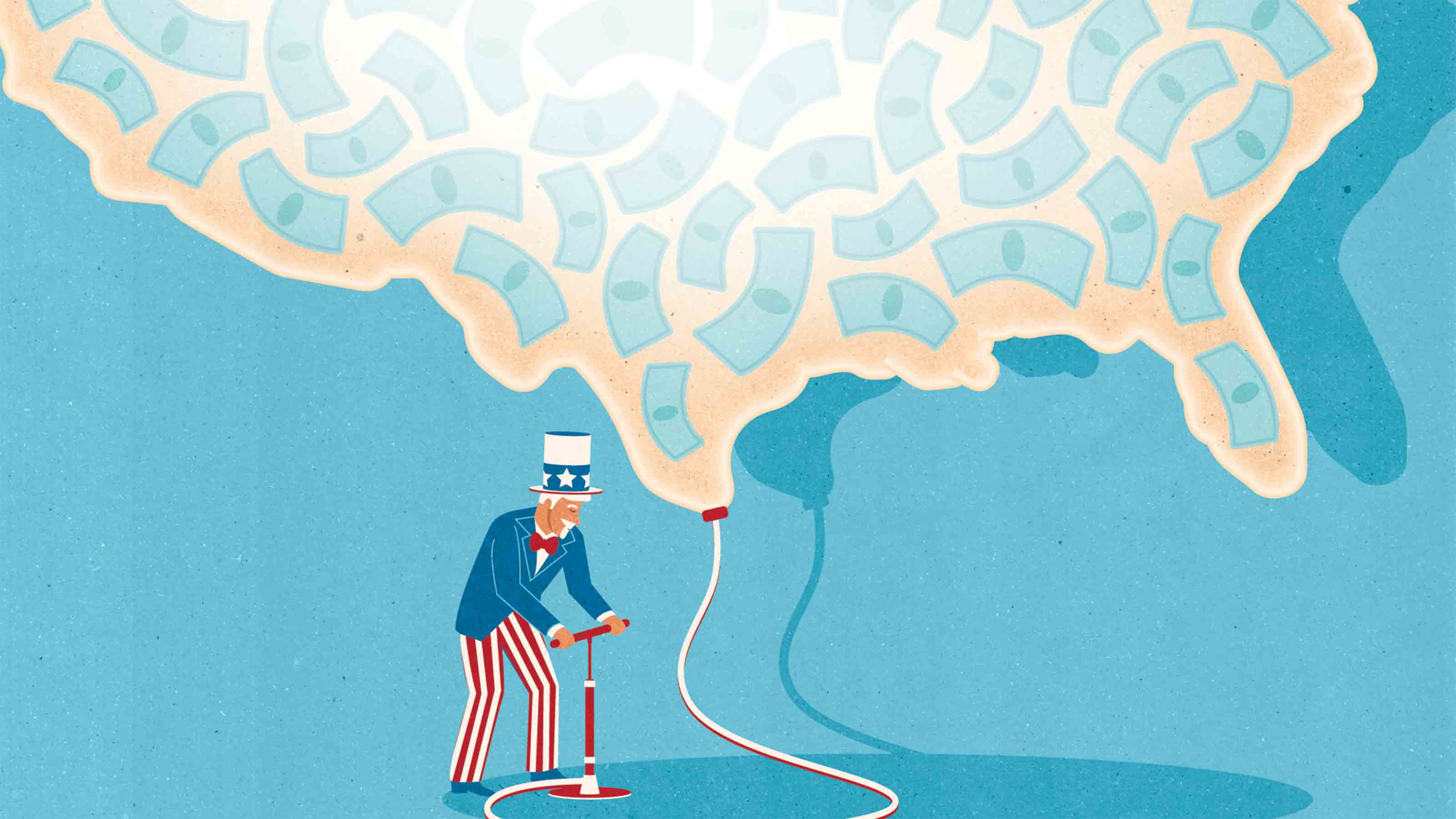What Will Be the Jobs of Tomorrow?
Though it's likely to be 2014 before the economy picks up enough steam for robust job creation -- in the neighborhood of 250,000 a month -- it's worth looking now at what kind of jobs employers will be looking to fill.

Profit and prosper with the best of Kiplinger's advice on investing, taxes, retirement, personal finance and much more. Delivered daily. Enter your email in the box and click Sign Me Up.
You are now subscribed
Your newsletter sign-up was successful
Want to add more newsletters?

Delivered daily
Kiplinger Today
Profit and prosper with the best of Kiplinger's advice on investing, taxes, retirement, personal finance and much more delivered daily. Smart money moves start here.

Sent five days a week
Kiplinger A Step Ahead
Get practical help to make better financial decisions in your everyday life, from spending to savings on top deals.

Delivered daily
Kiplinger Closing Bell
Get today's biggest financial and investing headlines delivered to your inbox every day the U.S. stock market is open.

Sent twice a week
Kiplinger Adviser Intel
Financial pros across the country share best practices and fresh tactics to preserve and grow your wealth.

Delivered weekly
Kiplinger Tax Tips
Trim your federal and state tax bills with practical tax-planning and tax-cutting strategies.

Sent twice a week
Kiplinger Retirement Tips
Your twice-a-week guide to planning and enjoying a financially secure and richly rewarding retirement

Sent bimonthly.
Kiplinger Adviser Angle
Insights for advisers, wealth managers and other financial professionals.

Sent twice a week
Kiplinger Investing Weekly
Your twice-a-week roundup of promising stocks, funds, companies and industries you should consider, ones you should avoid, and why.

Sent weekly for six weeks
Kiplinger Invest for Retirement
Your step-by-step six-part series on how to invest for retirement, from devising a successful strategy to exactly which investments to choose.
SEE ALSO: Ripple Effects of Unemployment
Next in line: Health care. By 2020, health care will account for about a fifth of the U.S. economy (it’s 18% now). Count on the U.S.’s aging population and increased desire for and access to health care to spawn millions of new jobs -- from home health and nursing aides to laboratory technicians to nurses, surgeons and everything in between.
Not far behind health care: The hospitality and leisure industries, which will seek food preparers and servers, bartenders, amusement park workers, fitness instructors, tennis and golf pros, maids, and hotel workers of all stripes. The construction sector -- employing carpenters, bricklayers, drywallers, electricians, roofers, landscapers, earth-moving equipment operators, road pavers and so on -- and retail, with a growing need for cashiers, clerks and the like, round out the top five.
From just $107.88 $24.99 for Kiplinger Personal Finance
Become a smarter, better informed investor. Subscribe from just $107.88 $24.99, plus get up to 4 Special Issues

Sign up for Kiplinger’s Free Newsletters
Profit and prosper with the best of expert advice on investing, taxes, retirement, personal finance and more - straight to your e-mail.
Profit and prosper with the best of expert advice - straight to your e-mail.
Finally, we expect manufacturing, both old-line and high-tech, to generate up to 400,000 new jobs as well, particularly those in high demand such as machinists, welders and assembly workers, though all will need computer skills not required in previous generations.
If the good news is that job growth will return, the bad news is that a majority of new jobs will be lower-wage, paying at least 15% below the average for all workers. That’ll put a damper on economic growth, holding down median household income and gains in consumer spending, vital because consumers account for 70% of economic activity.
But not all new jobs will be at the lower end of the pay scale. Mark Zandi, chief economist with Moody’s Analytics, points out that although jobs in services dominate, it's a mistake to think that they all pay a lesser wage.
He says, “I expect solid job gains in service activities such as accounting, legal, advertising, management consulting, architectural and engineering services, computer software and even financial services.” Add college teachers, nurses, sales representatives and truck drivers to the list of jobs with both growing demand and above-average compensation.
Plus there will be unpredictable winners -- jobs that don’t even exist now. As Nicole Smith, senior economist with the Center on Education and the Workforce at Georgetown University, says, “Five years ago, we didn’t have apps (for smart phones, iPads and the like). Now there’s a whole industry creating them."
College graduates, of course, stand the best prospects for landing a good job, and those with degrees in science, math, engineering, technology and health sciences stand the best chance, especially if they have a smattering of economics or business training, too.
Some of the most lucrative specialties: Petroleum engineering, pharmaceutical sciences and, of course, computer science. College grads will also maintain an edge over workers who end their schooling after grade 12, earning $1 million more, on average, over their lifetimes.
But increasingly, a sheepskin isn’t the ticket to a good job that it used to be. With unemployment high, employers are often able to land college grads for positions that used to go to those with just a high school diploma -- and for the same money.
Of 9 million young people who earned degrees between 2006 and 2011, 2 million say that their jobs don’t require higher education. What’s more, trained nongrads with good skills can count on good demand for their services -- folks such as plumbers, electricians and HVAC mechanics. Also X-ray technicians, dental hygienists and aircraft mechanics. In fact, about one-quarter of licensed skilled workers earn a bigger income than the average college grad does.
Profit and prosper with the best of Kiplinger's advice on investing, taxes, retirement, personal finance and much more. Delivered daily. Enter your email in the box and click Sign Me Up.

-
 Dow Adds 1,206 Points to Top 50,000: Stock Market Today
Dow Adds 1,206 Points to Top 50,000: Stock Market TodayThe S&P 500 and Nasdaq also had strong finishes to a volatile week, with beaten-down tech stocks outperforming.
-
 Ask the Tax Editor: Federal Income Tax Deductions
Ask the Tax Editor: Federal Income Tax DeductionsAsk the Editor In this week's Ask the Editor Q&A, Joy Taylor answers questions on federal income tax deductions
-
 States With No-Fault Car Insurance Laws (and How No-Fault Car Insurance Works)
States With No-Fault Car Insurance Laws (and How No-Fault Car Insurance Works)A breakdown of the confusing rules around no-fault car insurance in every state where it exists.
-
 Federal Debt: A Heavy Load
Federal Debt: A Heavy LoadEconomic Forecasts The debt continues to grow, but record-low interest rates could ease the long-term damage.
-
 How the Fed's Moves Affect You
How the Fed's Moves Affect YouEconomic Forecasts It’s pumping trillions of dollars into the economy and keeping rates near zero. Savers are sunk, but borrowers get a boost.
-
 U.S. Manufacturing Is Already Ailing from Coronavirus
U.S. Manufacturing Is Already Ailing from CoronavirusEconomic Forecasts Supplies are hard to come by, and in the longer-term demand may be at risk.
-
 Consumers Will Feel Impact of Rapidly Falling Interest Rates
Consumers Will Feel Impact of Rapidly Falling Interest RatesEconomic Forecasts Mortgage and car loans will experience the most significant dips, while some holders of Treasuries may get a slight boost.
-
 Will You Have to Pay More Sales Taxes on Your Online Purchases?
Will You Have to Pay More Sales Taxes on Your Online Purchases?business One thing’s for sure: Consumers who live in one of the five states without a sales tax won’t be affected by the Supreme Court’s ruling.
-
 What to Expect From the New Fed Chief
What to Expect From the New Fed ChiefEconomic Forecasts By and large, Jerome Powell will move along the path set by his predecessor.
-
 How a Border Tax Would Affect You
How a Border Tax Would Affect YouBusiness Costs & Regulation A plan to limit imports could raise prices but also create more jobs.
-
 A Housing Shortage Looms: Builders Can’t Keep Up
A Housing Shortage Looms: Builders Can’t Keep Upbusiness Starter homes especially are becoming scarce.